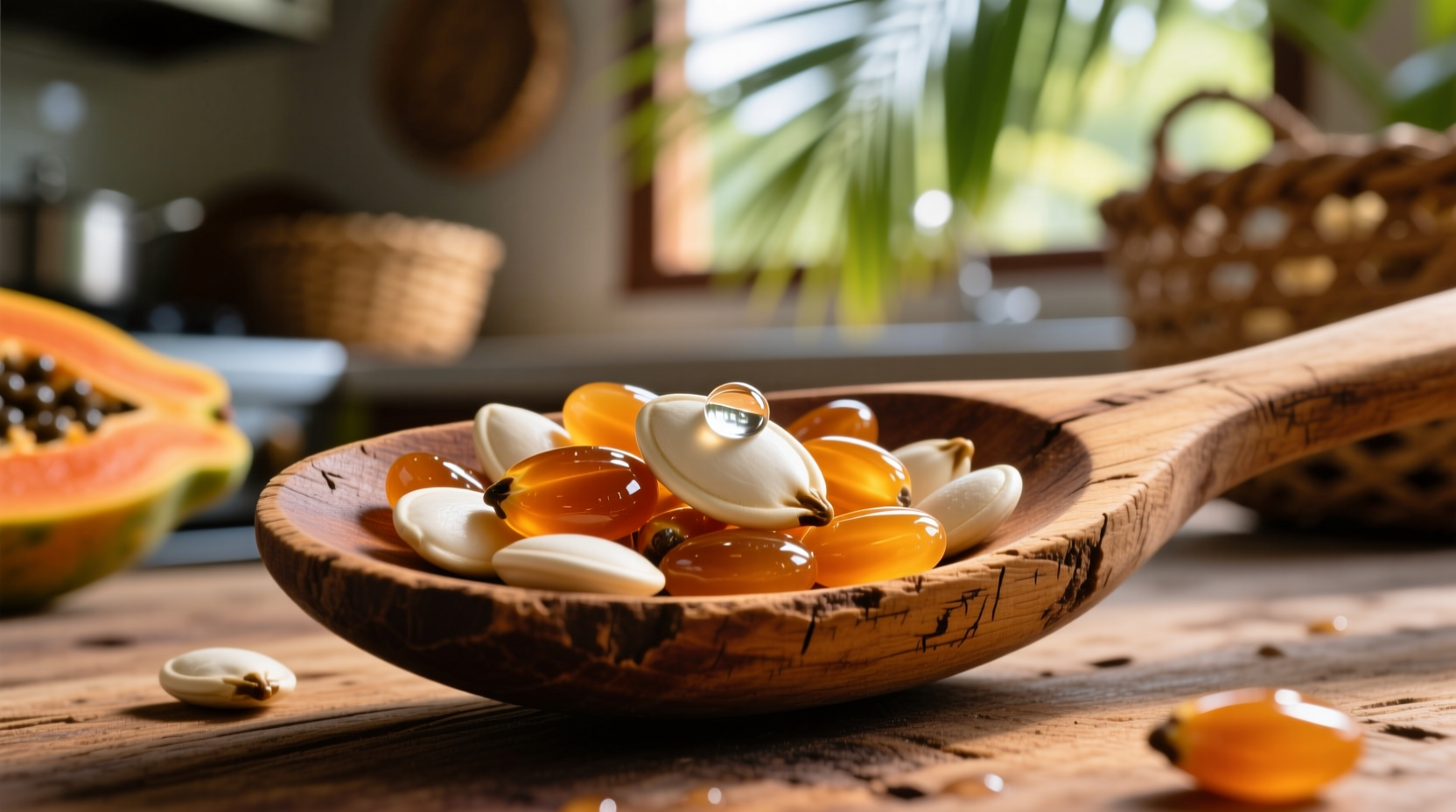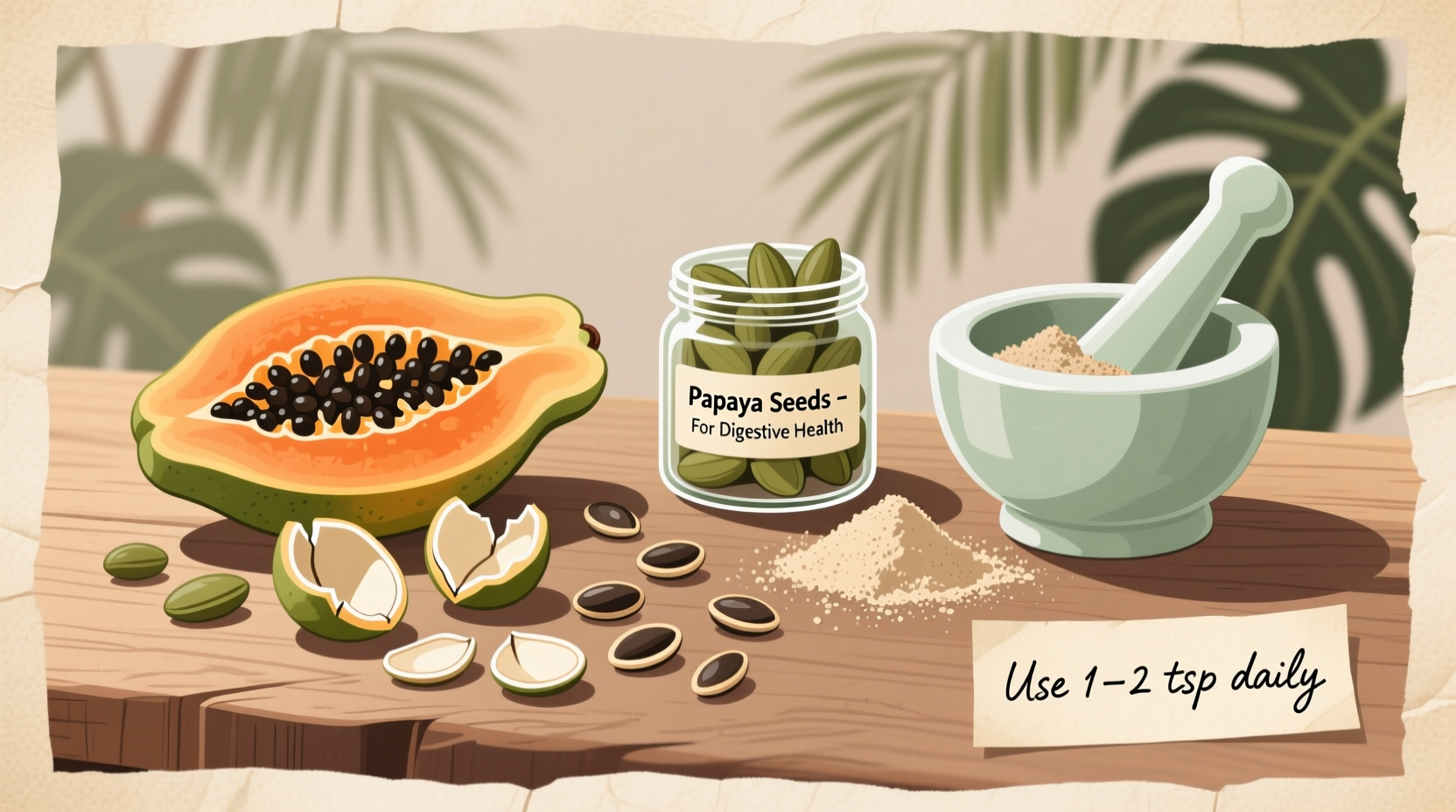Most people toss papaya seeds without realizing their culinary potential and health benefits. These small black gems offer a peppery flavor and contain valuable nutrients that can enhance your cooking while reducing food waste. Understanding how to properly prepare and use papaya seeds transforms what's typically discarded into a valuable kitchen resource.
Preparing Papaya Seeds for Use
Before exploring papaya seed applications, proper preparation is essential. Fresh papaya seeds come coated in a gelatinous membrane that must be removed for optimal flavor and texture.
Start by scooping seeds from ripe papaya into a fine-mesh strainer. Gently rub seeds under cold running water to separate them from the surrounding pulp. For thorough cleaning, massage the seeds between your fingers to remove all membrane residue. Properly cleaned seeds should feel slightly gritty but free of slippery coating.
| Preparation Method | Best For | Shelf Life |
|---|---|---|
| Fresh, cleaned | Immediate use in dressings | 3-4 days refrigerated |
| Air-dried (24-48 hrs) | Grinding as pepper substitute | 2-3 months stored properly |
| Dehydrated (125°F/52°C) | Long-term storage | 6+ months in airtight container |
Drying methods significantly impact shelf life and flavor intensity. Air-drying on parchment paper at room temperature works well for small batches, while food dehydrators produce more consistent results. Avoid oven drying at high temperatures, which can diminish enzymatic benefits. Store dried seeds in airtight containers away from light and moisture.
Culinary Applications of Papaya Seeds
Papaya seeds offer a distinctive peppery flavor with subtle citrus notes, making them versatile in various dishes. Their unique taste profile works particularly well in tropical and Asian-inspired cuisine.
As a Pepper Substitute
When ground, papaya seeds provide a complex alternative to black pepper with less heat and more nuanced flavor. The enzymatic compound carpaine gives them a distinctive taste that complements both sweet and savory dishes.
For best results, use a spice grinder to process dried seeds into a fine powder. Start with small amounts—¼ teaspoon replaces about ½ teaspoon of black pepper. The flavor intensifies slightly when heated, so add toward the end of cooking for maximum impact.
In Salad Dressings and Marinades
Fresh or lightly crushed papaya seeds add texture and flavor to vinaigrettes. Their natural enzymes help tenderize proteins, making them excellent for meat marinades.
Try this simple citrus-papaya seed dressing: Combine 2 tablespoons fresh lime juice, ¼ cup olive oil, 1 teaspoon honey, 1 tablespoon crushed papaya seeds, and a pinch of salt. Whisk until emulsified. This dressing works particularly well with grilled fish or tropical fruit salads.
Smoothie Boosters
Adding ½-1 teaspoon of fresh papaya seeds to smoothies provides digestive benefits without overwhelming flavor. The seeds contain papain, an enzyme that aids protein digestion.
For optimal nutrient retention, add seeds after blending other ingredients. Their mild bitterness balances sweet fruits like mango and pineapple. Limit to 1 teaspoon per serving to avoid potential digestive upset from excessive consumption.
Health Benefits and Scientific Evidence
Research indicates papaya seeds contain valuable compounds with potential health benefits. According to a 2017 study published in the Journal of Ethnopharmacology, papaya seeds demonstrate antimicrobial properties against certain foodborne pathogens (source).
Nutritionally, papaya seeds provide:
- Healthy fats including oleic acid
- Dietary fiber for digestive health
- Trace minerals like magnesium and calcium
- Antioxidants including flavonoids
Traditional medicine systems have used papaya seeds for centuries. In Ayurvedic practice, they're recommended in small quantities for digestive support. However, scientific evidence supporting many traditional claims remains limited and primarily based on preliminary studies.
Important Usage Considerations
While papaya seeds offer benefits, certain limitations and precautions should be considered:
Pregnancy and Medication Interactions: Limited research suggests papaya seeds may affect uterine activity. Pregnant women should consult healthcare providers before regular consumption. Those taking blood thinners should exercise caution due to potential interactions.
Appropriate Consumption Amounts: Most experts recommend limiting intake to 1-2 teaspoons of fresh seeds or ½ teaspoon of dried, ground seeds daily. Excessive consumption may cause digestive discomfort.
Allergy Considerations: Individuals with latex allergies may experience cross-reactivity with papaya due to similar proteins. Start with small amounts if you have known latex sensitivity.
Creative Non-Culinary Applications
Beyond the kitchen, papaya seeds have practical household uses:
Natural Pest Deterrent: Dried, crushed papaya seeds scattered around garden beds may help deter certain insects. The strong scent and enzymatic properties create an unfavorable environment for some pests.
Composting Accelerator: When added to compost piles, papaya seeds' enzymatic properties can help break down organic matter more efficiently. Their high nitrogen content benefits the composting process.
Seed Saving for Gardening: Properly fermented and dried papaya seeds can be stored for planting. This process involves soaking cleaned seeds in water for 2-3 days, then drying thoroughly before storage in cool, dark conditions.

Common Mistakes to Avoid
Many home cooks make these errors when working with papaya seeds:
- Insufficient cleaning: Leaving membrane residue creates unpleasant texture and off-flavors
- Overconsumption: Exceeding recommended amounts may cause digestive upset
- Improper storage: Moisture exposure leads to mold growth within days
- Overheating: High cooking temperatures destroy beneficial enzymes
For best results, treat papaya seeds like other specialty spices—store properly, use in moderation, and add toward the end of cooking to preserve their unique flavor compounds.
Seasonal Availability and Selection Tips
Papaya season varies by region but generally runs from summer through fall in most growing areas. When selecting papayas for seed harvesting, choose fully ripe but not overripe fruit. The seeds from underripe papayas contain higher levels of latex, which creates an unpleasant bitterness.
Organic papayas are preferable for seed harvesting since conventional varieties may have pesticide residues concentrated in the seeds. If organic isn't available, thoroughly wash conventionally grown papayas before extracting seeds.











 浙公网安备
33010002000092号
浙公网安备
33010002000092号 浙B2-20120091-4
浙B2-20120091-4